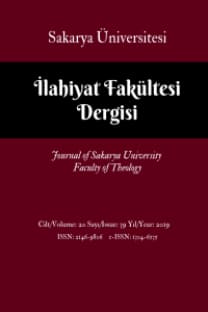ARİSTOTELES'TE EN YÜKSEK ENTELEKTÜEL ERDEM
Pek çok şârihe göre, Aristoteles Nikomakhos’a Etik’in 1. Kitap’ında mutluluğu bütün erdemlere uygun olan bir faaliyet olarak görürken 10. Kitap’ta mutluluğu tek bir erdemle, felsefi bilgelik, özdeşleştirir. Bu makalede bütün Nikomakhos’a Etik’in en şaşırtıcı ve belki de kitabın akışı içinde beklenmedik pasajların yer aldığı 10. Kitap’ın 7. ve 8. kısmını inceliyorum. Burası anlaşılmak ve kitabın önceki bölümleri ile bağdaşımlı bir diyaloğa sokulmak için uğruna kitaplar da yazılan bir problem alanı. En yüksek entelektüel erdemin Tanrı ile açıkça ilişkisini kuran Aristoteles, mükemmel mutluluğu da ona vererek, metafizik, epistemoloji, etik ve din felsefesinin kesişme noktasına işaret eder. Bu bağlamda makalede başlıca amaçlarım şunlardır: Aristoteles’in en yüksek entelektüel erdeminin doğurduğu temaşa hayatını sergilemek ve bu hayatın kapsayıcı görüşle uyumlu olduğunu savunmak.
Anahtar Kelimeler:
Aristoteles, Temaşa, Felsefi bilgelik, Erdem, Akıl, Tanrı, Mutluluk
The Highest Intellectual Virtue in Aristotle
According to many commentators, on the one hand, Aristotle elaborates the concept of happiness as an action in coherence with all virtues in the first book of The Nicomachean Ethics, on the other hand, in the last book of The Nicomachean Ethics, he consubstantiates happiness with only one virtue, which is philosophical wisdom.In this article, I examine parts 7 and 8 of Book 10 of The Nicomachean Ethics,which are probably the most interesting and unexpected passages in the the book. These parts arethe most problematic areas whichbecame a subject matter of many books for the clarifications of the issues. Aristotle obviously claims that there is a relationship between the best intellectual virtue and God, giving him perfect happiness, which indicates that there is an intersection point among metaphysics, epistemology, ethic and philosophy of religion.In this context, the main aims of this article are, first, to describe the contemplative life which is causedby the highest intellectual virtue and to claim that this life is in harmony with the inclusivist theory.
Keywords:
Aristotle, Contemplation, Philosophic wisdom, Virtue, Reason, God, Happiness,
- ISSN: 2146-9806
- Yayın Aralığı: Yılda 2 Sayı
- Başlangıç: 2001
- Yayıncı: Sakarya Üniversitesi
Sayıdaki Diğer Makaleler
İNSAN KONULU SÖZCÜKLER BAĞLAMINDA FASİH ARAPÇA VE MISIR LEHÇESİ BİR KARŞILAŞTIRMA DENEMESİ
Religious Difference in a Secular Age: A Minority Raport, Saba Mahmood
ARİSTOTELES'TE EN YÜKSEK ENTELEKTÜEL ERDEM
İSLÂM’DA KADININ KONUMUNA MODERN YAKLAŞIMLAR -MÛSÂ CÂRULLAH ÖRNEĞİ-
ŞİÎ-USÛLÎ DÜŞÜNCENİN ORTAYA ÇIKIŞ SEBEPLERİ ÜZERİNE MÜLAHAZALAR
FIKIH TARİHİ BAĞLAMINDA OSMANLI TECRÜBESİNİ DOĞRU ANLAMAK
MUHAMMED FERÎD VECDÎ'NİN MAKÂMELERİNDE AHLÂKÎ VE SOSYAL KONULAR
HANEFÎ HADİS ANLAYIŞININ FETHU’L-KADÎR’E YANSIMALARI VE İBNÜ’L-HÜMÂM’IN TERCİHLER
